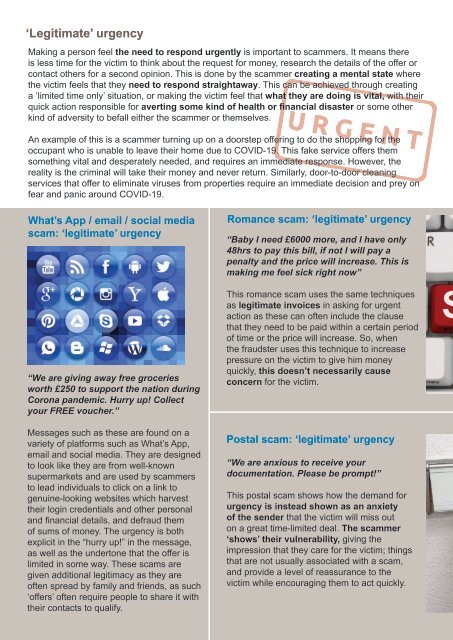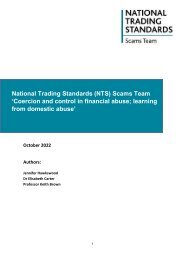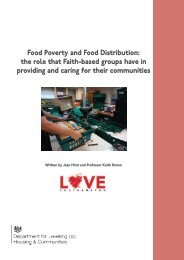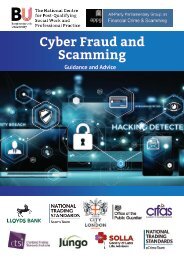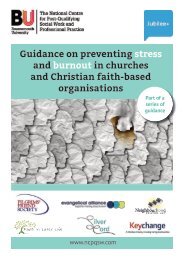0-Scams The Power of Persuasive Language
This publication shows how criminals use language in subtle and powerful ways to scam people out of money. It highlights how, far from the popular idea of the gullible or vulnerable person ‘falling for’ a scam, the reality is that scammers are highly skilled manipulators of language that use techniques designed to make people feel at ease and disguise any cause for concern. This booklet will show some of the ways in which scammers use the reassurance of familiarity, our normal instincts to protect, and isolation from support to draw people in and justify their behaviour.
This publication shows how criminals use language in subtle and powerful ways to scam people
out of money. It highlights how, far from the popular idea of the gullible or vulnerable person
‘falling for’ a scam, the reality is that scammers are highly skilled manipulators of language
that use techniques designed to make people feel at ease and disguise any cause for concern.
This booklet will show some of the ways in which scammers use the reassurance of familiarity, our
normal instincts to protect, and isolation from support to draw people in and justify their behaviour.
Create successful ePaper yourself
Turn your PDF publications into a flip-book with our unique Google optimized e-Paper software.
‘Legitimate’ urgency<br />
Making a person feel the need to respond urgently is important to scammers. It means there<br />
is less time for the victim to think about the request for money, research the details <strong>of</strong> the <strong>of</strong>fer or<br />
contact others for a second opinion. This is done by the scammer creating a mental state where<br />
the victim feels that they need to respond straightaway. This can be achieved through creating<br />
a ’limited time only’ situation, or making the victim feel that what they are doing is vital, with their<br />
quick action responsible for averting some kind <strong>of</strong> health or financial disaster or some other<br />
kind <strong>of</strong> adversity to befall either the scammer or themselves.<br />
An example <strong>of</strong> this is a scammer turning up on a doorstep <strong>of</strong>fering to do the shopping for the<br />
occupant who is unable to leave their home due to COVID-19. This fake service <strong>of</strong>fers them<br />
something vital and desperately needed, and requires an immediate response. However, the<br />
reality is the criminal will take their money and never return. Similarly, door-to-door cleaning<br />
services that <strong>of</strong>fer to eliminate viruses from properties require an immediate decision and prey on<br />
fear and panic around COVID-19.<br />
What’s App / email / social media<br />
scam: ‘legitimate’ urgency<br />
“We are giving away free groceries<br />
worth £250 to support the nation during<br />
Corona pandemic. Hurry up! Collect<br />
your FREE voucher.”<br />
Messages such as these are found on a<br />
variety <strong>of</strong> platforms such as What’s App,<br />
email and social media. <strong>The</strong>y are designed<br />
to look like they are from well-known<br />
supermarkets and are used by scammers<br />
to lead individuals to click on a link to<br />
genuine-looking websites which harvest<br />
their login credentials and other personal<br />
and financial details, and defraud them<br />
<strong>of</strong> sums <strong>of</strong> money. <strong>The</strong> urgency is both<br />
explicit in the “hurry up!” in the message,<br />
as well as the undertone that the <strong>of</strong>fer is<br />
limited in some way. <strong>The</strong>se scams are<br />
given additional legitimacy as they are<br />
<strong>of</strong>ten spread by family and friends, as such<br />
‘<strong>of</strong>fers’ <strong>of</strong>ten require people to share it with<br />
their contacts to qualify.<br />
Romance scam: ‘legitimate’ urgency<br />
“Baby I need £6000 more, and I have only<br />
48hrs to pay this bill, if not I will pay a<br />
penalty and the price will increase. This is<br />
making me feel sick right now”<br />
This romance scam uses the same techniques<br />
as legitimate invoices in asking for urgent<br />
action as these can <strong>of</strong>ten include the clause<br />
that they need to be paid within a certain period<br />
<strong>of</strong> time or the price will increase. So, when<br />
the fraudster uses this technique to increase<br />
pressure on the victim to give him money<br />
quickly, this doesn’t necessarily cause<br />
concern for the victim.<br />
Postal scam: ‘legitimate’ urgency<br />
“We are anxious to receive your<br />
documentation. Please be prompt!”<br />
This postal scam shows how the demand for<br />
urgency is instead shown as an anxiety<br />
<strong>of</strong> the sender that the victim will miss out<br />
on a great time-limited deal. <strong>The</strong> scammer<br />
‘shows’ their vulnerability, giving the<br />
impression that they care for the victim; things<br />
that are not usually associated with a scam,<br />
and provide a level <strong>of</strong> reassurance to the<br />
victim while encouraging them to act quickly.


